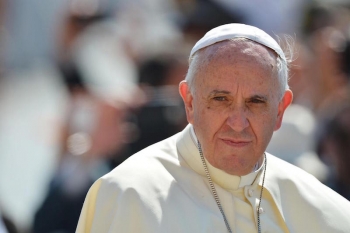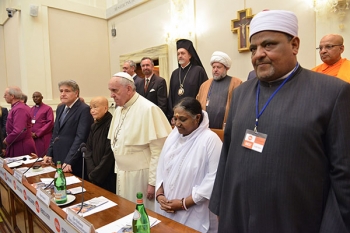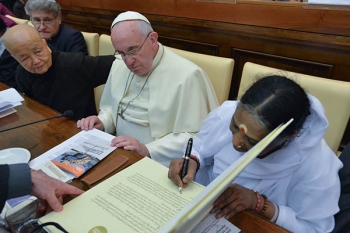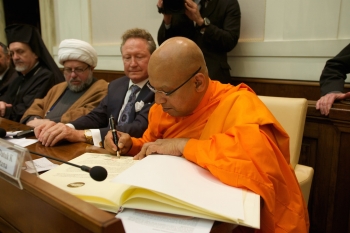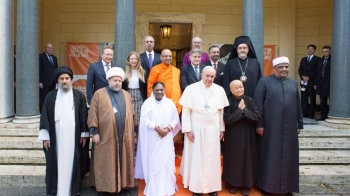On 21 April, the Roman Catholic Church issued a Vesak message for the world’s Buddhists, titled “Buddhists and Christians, together to counter modern slavery.” The president of the Pontifical Council for Interreligious Dialogue, Cardinal Jean-Louis Tauran, reached out to Buddhists by stating: “ . . . the Buddha declares that trading in live beings, including slaves and prostitutes, is one of five occupations that are not to be engaged in. He instructs that possessions are to be acquired peacefully, honestly and by legal means, without coercion, violence or deceit, and by means that do not cause harm or suffering. In this way, Buddhism promotes respect for the life and freedom of each person.”
This message had its antecedents in a meeting on 2 December 2014 at the Vatican, where representatives of different faiths met Pope Francis to co-sign the Declaration of Religious Leaders against Slavery.* The Buddhist signatories were Venerable Thich Nhy Chan Khong, who represented Zen master Thich Nhat Hanh (as she has so often done so throughout her exemplary life), and The Most Venerable Datuk K. Sri Dhammaratana, chief high priest of Malaysia’s Buddhists. Cardinal Tauran’s Vesak appeal therefore wielded considerable moral weight because it maintained thematic continuity with an issue already on the agenda between Buddhist and Catholic leaders before Vesak.
Slavery is a global blight, and the December co-signatories, in the language of the Declaration, vowed to “wipe out all forms of” it by 2020. This is a bold commitment that Buddhists are not all beholden to, since Buddhism has no centralized authority like the Pope. Nevertheless, by co-signing, Ven. Chan Khong and The Most Venerable Dhammaratana have challenged the world’s Buddhists to follow their example.
In its contemporary incarnation, the numbers involved in the slave trade surpass any other time in history. The Pope gave some examples in his XLVIII Message for the World Day of Peace on 1 January: men and women in indentured servitude and child workers; migrants who endure physical, emotional, and sexual abuse while working in appalling conditions; anyone forced into prostitution; male and female sex slaves; and people forced to fight in wars. The UN estimates the total number of men, women, and children in slavery (counting all of Pope Francis’s examples, including trafficked people) to be a staggering 27 to 30 million, with an annual turnover of US$35 billion.
The Vatican’s invitation deserves a serious and sympathetic response from Buddhists. Almost all religions agree that slavery violates every definition of human dignity. Slavery is insidious enough in a secular context, but the implications become even viler when it is recast in a Buddhist worldview, in which the human being is actually a Buddha.
Many forms of slavery, including forced labor and the sex slave trade, are rife in regions where Buddhism has a presence—Southeast Asia, South Asia, and parts of East Asia. Women and children from impoverished families are abused and trafficked around the world for sexual exploitation, which encompasses 58 per cent of the total slave trade. In Nepal, where Hinduism and Buddhism intertwine in daily life, the UN estimates that 12–15,000 girls are smuggled out of the country annually, ending up in brothels in India or as far away as South Korea. That number, reports The Guardian, is set to spike with the tragic earthquake in April that devastated so many towns, villages, and families.
